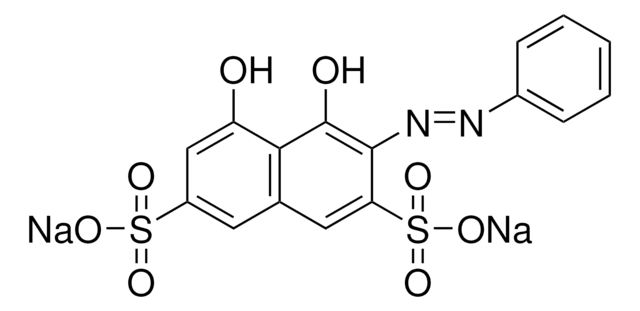D2535
Direct Blue 15
suitable for Histopaque® system, Powder
About This Item
Productos recomendados
product name
Direct Blue 15, suitable for Histopaque® system, suitable for viability studies of collagenase-treated rat liver cells
descripción
suitable for Histopaque® system
Nivel de calidad
formulario
powder
composición
Dye content, ~44%
color
dark blue
solubilidad
water: 10 mg/mL, clear, blue
idoneidad
suitable for viability studies of collagenase-treated rat liver cells
aplicaciones
diagnostic assay manufacturing
hematology
histology
temp. de almacenamiento
room temp
cadena SMILES
[Na+].[Na+].[Na+].[Na+].COc1cc(ccc1N=Nc2c(O)c3c(N)cc(cc3cc2S([O-])(=O)=O)S([O-])(=O)=O)-c4ccc(N=Nc5c(O)c6c(N)cc(cc6cc5S([O-])(=O)=O)S([O-])(=O)=O)c(OC)c4
InChI
1S/C34H28N6O16S4.4Na/c1-55-25-9-15(3-5-23(25)37-39-31-27(59(49,50)51)11-17-7-19(57(43,44)45)13-21(35)29(17)33(31)41)16-4-6-24(26(10-16)56-2)38-40-32-28(60(52,53)54)12-18-8-20(58(46,47)48)14-22(36)30(18)34(32)42;;;;/h3-14,41-42H,35-36H2,1-2H3,(H,43,44,45)(H,46,47,48)(H,49,50,51)(H,52,53,54);;;;/q;4*+1/p-4
Clave InChI
OLSOUGWNONTDCK-UHFFFAOYSA-J
¿Está buscando productos similares? Visita Guía de comparación de productos
Categorías relacionadas
Aplicación
Información legal
Palabra de señalización
Danger
Frases de peligro
Consejos de prudencia
Clasificaciones de peligro
Carc. 1B
Código de clase de almacenamiento
6.1C - Combustible acute toxic Cat.3 / toxic compounds or compounds which causing chronic effects
Clase de riesgo para el agua (WGK)
WGK 3
Punto de inflamabilidad (°F)
Not applicable
Punto de inflamabilidad (°C)
Not applicable
Choose from one of the most recent versions:
Certificados de análisis (COA)
Don't see the Right Version?
If you require a particular version, you can look up a specific certificate by the Lot or Batch number.
¿Ya tiene este producto?
Encuentre la documentación para los productos que ha comprado recientemente en la Biblioteca de documentos.
Los clientes también vieron
Nuestro equipo de científicos tiene experiencia en todas las áreas de investigación: Ciencias de la vida, Ciencia de los materiales, Síntesis química, Cromatografía, Analítica y muchas otras.
Póngase en contacto con el Servicio técnico













